Features
Let Me In The Sound
U2 Albums Ranked Worst to Best
by Benjamin Ray
I first learned of U2 through their 1980-1990 hits collection shortly after it was released in 1998, when I was 15. I had heard their major songs on the radio prior to that, of course, but that disc really got me interested in the band, especially the fantastic “Sunday Bloody Sunday.” It led to an exploration of the group’s entire output, which converted me to a committed fan. Unlike casual fans, my favorite U2 songs are not the hits from that album, the ones that get played on the radio and at stadiums all the time, but the deep cuts and album tracks that really show the personality and range of this Irish post-punk stadium-rock band. It’s the grand gestures and the showmanship that makes these guys so much fun, but it’s the big heart, the depth of catalog, the longevity and the vulnerability that make them essential to your life, to my life. Below is a ranking of their 13 studio albums, from the 1980 debut up through the 2014 free download Songs of Innocence.
13. October (1981)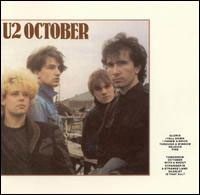
Without the immediacy of the debut and without the gravity of what would come shortly after, October never really comes to life the way every other U2 album does. But a sophomore slump is fine, and this one still generates interest...just not enough.
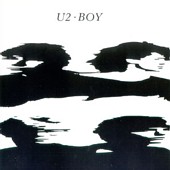 12. Boy (1980)
12. Boy (1980)
A youthful album in spirit, sound, and lyrical content, but a fascinating debut record that has held up well over the years. “I Will Follow” remains a live staple for the band, and the dark “An Cat Dubh” is a minor gem, with the balance of the record full of the raw, nervy energy and post-punk nature that characterized many albums of the era. It’s not really a disc that you’ll need to revisit that much the older you get, but it still has charms for when you do.
11. All That You Can’t Leave Behind (2000)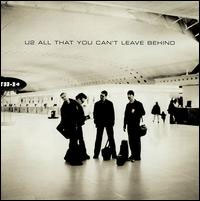
Massively hyped upon its release as a return to form (imagine!), this album suffered from overexposure, many Grammy wins, and lots of media coverage. Once that all faded, the end result was a rather dull adult contemporary album with only a few flashes of spirit (the soaring “Beautiful Day,” the hit “Elevation,” the quirky “In A Little While”). People were happy to not have another Pop on their hands, I suppose, and a moody, anthemic band given to grand gestures worked perfectly following 9/11, when we needed one like that. But without the spectacle and context, this is not a great album.
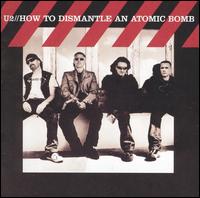 10. How To Dismantle an Atomic Bomb (2004)
10. How To Dismantle an Atomic Bomb (2004)
Flawed but fascinating, an album that Bono has more or less dismissed, Bomb is better than its predecessor. “Vertigo” is as affecting a rock single as the band ever put out, “Sometimes You Can’t Make It On Your Own” is an effective, moving slow song, “Love And Peace Or Else” is far better than its title, and “A Man And A Woman” is one of the band’s best album cuts ever, with Adam Clayton’s bass taking the spot of lead instrument. The album trails off at the end, but so does every other U2 album.
9. Zooropa (1993)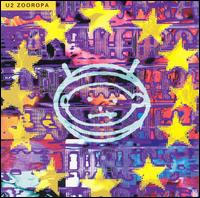
The strangest U2 album ever released was supposed to be an EP, but ideas grew out of the sessions and yielded this effort. It’s ironic, electronic, glammed-up pop different from any other U2 album save for Pop, moving from the falsetto vocals of the slinky dance number “Lemon” to the minimalist drone “Numb” to the alien weariness of “Daddy’s Gonna Pay For Your Crashed Car” to the downbeat ballad “Stay (Faraway, So Close).” Then, to offset all of this, the band brought in Johnny Cash to sing over “The Wanderer,” which is both a tribute to Cash’s legacy and an effective song in its own right, with Bono providing keening wordless backup toward the end and The Edge chiming in with ringing country guitar licks. Really, this album has something for everyone.
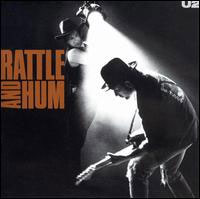 8. Rattle And Hum (1988)
8. Rattle And Hum (1988)
A companion to The Joshua Tree, this double album is sort of a mess, mixing live cuts from the tour with new studio tracks recorded during the tour and documented in the film. Had the live versions of existing songs been cut out and a few other unnecessary cuts trimmed, this could have been a great follow-up studio album, but the full version is bloated and not always necessary. The live take of “Bullet the Blue Sky” is superior, though, while the studio songs “Desire” (a Grammy winner),” the BB King duet “When Love Comes to Town,” the moving “Heartland,” the offhand Lennon swipe “God Pt. 2,” and the closing “All I Want Is You” are among the band’s best work of the era, even as they signified that said era needed to come to a close.
7. Achtung Baby (1991)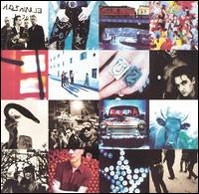
A lot of people will be surprised that this is so far down the list, as it routinely gets the highest grades available. But I never bought into it to the same level. Yes, it’s a radical reinvention, and its best moments are truly sublime (“One,” “Mysterious Ways,” “Even Better Than The Real Thing”). The problem is that there aren’t enough of those moments because there is a considerable amount of filler like “Love Is Blindness,” “So Cruel,” “Who’s Gonna Ride Your Wild Horses,” and “Zoo Station.” It’s a crime that the B-side “Salome” didn’t make the final album, as it would have been an improvement, but such is life. Honestly, these are all fine songs, but it’s not up to the consistent levels of musical brilliance as the other albums farther up this list.
 6. No Line On The Horizon (2009)
6. No Line On The Horizon (2009)
Holed up in Morocco, the quartet worked for a long time on this album and finally dropped it in 2009, to the expected hype and resulting lukewarm reviews. It has everything you expect from a U2 disc, from Serious Songs like “Cedars Of Lebanon” and “White As Snow” to churning rockers “Breathe” and “Get On Your Boots,” as well as a soaring anthems (“Magnificent”), slight experimentation (“Fez - Being Born”) to midtempo U2-by-numbers (“Stand-Up Comedy” and the title song), but it is all done very well, with confidence and a yearning spirit that will never die. The album’s best song, and Rolling Stone’s warranted pick for best song of the year that year, was the stunning “Moment Of Surrender,” an absolutely moving, hymn-like number about those little moments in life when you feel overwhelmed or unsure of yourself and your decisions, and how even the smallest things can make you question everything. It’s honest, moving and wonderful, equal parts anthemic and personal, the way the best U2 always has been.
5. Songs Of Innocence (2014)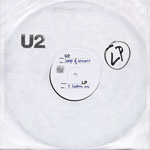
The infamous album given for free to all iTunes customers, the marketing ploy for Songs Of Innocence is at considerable odds with the quality and subject matter of the music within. The songs all detail the band’s life as youths in Ireland, touching on the discovery of music, the war-torn neighborhoods, parental relationships and the finding of a special place that means a lot to you. Bono scales the pretension, posturing, and subject matter way back here, focusing instead on the very personal, and after decades of saving the world the inward look is welcome. The lyrics are specific enough to matter to the band but not specific enough to apply to only them, meaning that anyone can step inside the narrator’s shoes and feel the same. Perhaps “The Miracle” wasn’t a great choice for first single, but it’s hardly offensive; far better is the middle part of the disc with “Raised By Wolves,” “Cedarwood Road,” and “Volcano,” which also recall the sound of Boy and that era of post-punk.
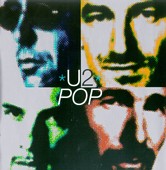 4. Pop (1997)
4. Pop (1997)
People love to hate this record, and I know not why. Sure, it has some garish clunkers like “Miami” and “The Playboy Mansion,” but it has so many great songs that dismissing it is offensive. U2 was never better in this decade than on the driving, looping, kinetic, and highly personal “Mofo,” which rampages through the speakers like a rhino on cocaine. “Last Night On Earth” and “Gone” are great songs, written with club-savvy electronica in mind, perhaps, but still retaining the U2 spirit, while “Staring At The Sun” is a fine slower song and “Do You Feel Loved” has a dark atmosphere. Buried toward the end is “Please,” one of the band’s best songs in its melancholy, muted intensity, and call for world peace.
3. War (1983)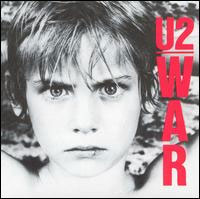
On their third outing, U2 delivered a masterwork. “Sunday Bloody Sunday” is their first and best anthem, its martial drums setting the stage for Bono’s heartbroken, strident observations of war in his beloved home Ireland. “New Year’s Day” is almost as good, and the more human aspects of wartime are addressed in the marching “Seconds” and the more spacy “Surrender.” A love song, “Two Hearts Beat As One,” breaks up the more serious matter, and then things close with a hopeful Bible message in “40.” A few missteps here and there, but overall a very good album.
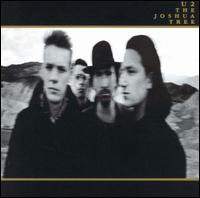 2. The Joshua Tree (1987)
2. The Joshua Tree (1987)
A commercial juggernaut and the album forever linked to the band, for better or worse. “With Or Without You” remains an effective love song still mysterious in its true intentions, “Where the Streets Have No Name” is as bracing and anthemic an album opener as the band ever had and “Bullet The Blue Sky” is very good, making effective use of a spoken-word outro of Bono’s musings on life in America. The second half would of course never measure up to the hits on the first half, but it’s still good, especially the dramatic throb of “Exit” and the chiming “In God’s Country.”
1. The Unforgettable Fire (1984)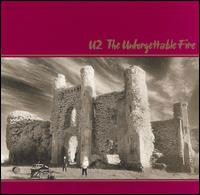
This is where the U2 “sound” really started, thanks to Brian Eno and Daniel Lanois taking over as producers. It’s also a mix of the band’s best tendencies toward post-punk rock, drama and global or historical concerns, and it also marks the start of the band’s fascination with America, which would come into play on Rattle And Hum. The atmospherics of the title song make it a true classic, “Pride” is of course a clarion calling card and “Bad” is the most effective two-chord song of the decade, mixing personal emotion (it’s an elegy for a friend) with anthemic strut, an appealing trait few bands have been able to copy except for Pearl Jam. “A Sort Of Homecoming” is a good opener, signaling the direction this new band would take, but “Wire” is even better, a frenzied post-punker that is among the band’s fastest songs (at least in the verses) and leads into a cool spoken outro, with Bono barking out his words to keep up with the band’s racing pulse. Only “Elvis Presley And America” stinks to high heaven, but it’s buried near the end, with the closing “MLK” leaving on a hopeful note, much like “40” did on the previous disc. This album is U2 doing everything right but without the hype, self-importance, and media frenzy that would later follow, and it’s their finest album.